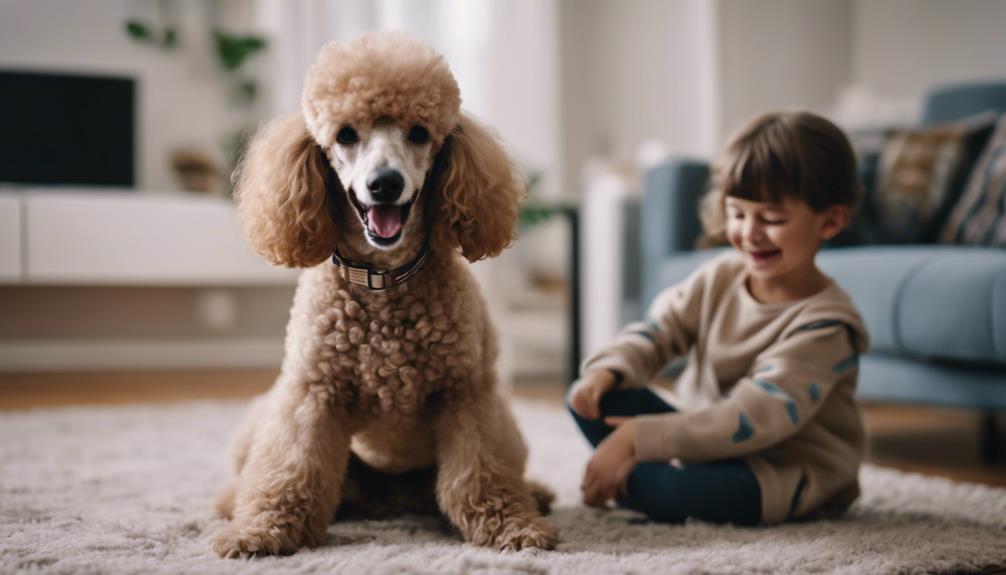Imagine a bond so strong that it shapes your child's growth, providing companionship and lessons in empathy. The connection between poodles and children is not just about play but about fostering a secure and trusting relationship. How can you ensure this bond remains harmonious and safe for both parties involved? Let's explore the essential steps needed to nurture a lasting and loving connection between your poodle and your child.
Key Takeaways
- Poodles exhibit patient and gentle behavior, forming strong bonds with children.
- Establish safe boundaries and playtime, emphasizing gentle interactions and structured activities.
- Foster trust through positive play dynamics, mutual respect, and attentive supervision.
- Prioritize safety by recognizing cues, addressing discomfort, and implementing consistent rules for a harmonious relationship.
Poodle Temperament Around Kids
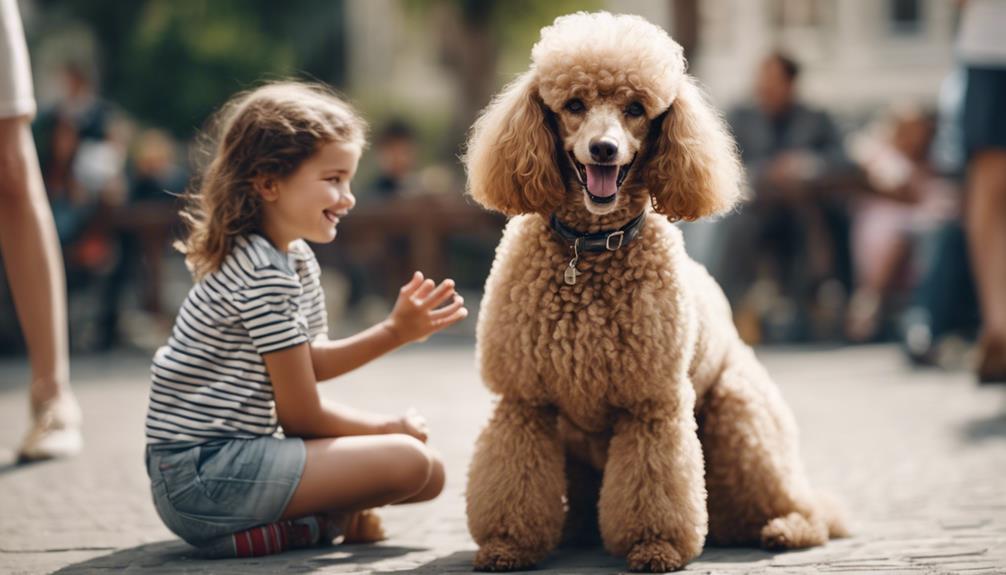
When it comes to poodle temperament around kids, their patient and gentle nature shines through, making them ideal companions for young ones. Poodles are well-known for their ability to form strong bonds with family members, including children. Their intelligence allows them to adapt to the varying behaviors and emotions of kids, making interactions smoother and more enjoyable for everyone involved. Poodles are receptive to the energy levels and play styles of children, often matching their enthusiasm with playful antics. This compatibility fosters a sense of companionship and fun within the family unit.
Families can feel confident in having poodles around their children due to the breed's inherent gentleness and adaptability. Poodles have a natural inclination to be caring and protective, which can provide parents with peace of mind when their kids are interacting with these furry friends. By understanding and appreciating the poodle's temperament around kids, families can create a safe and loving environment where both children and poodles can thrive together.
Socializing Poodles With Children
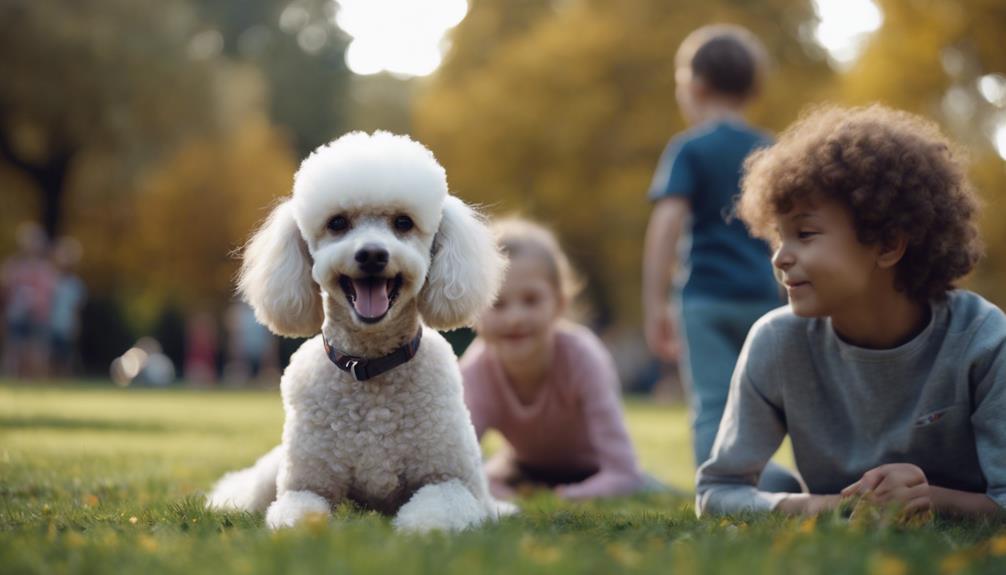
When socializing your poodle with children, ensure safety during playtime, understanding communication cues, and providing supervision for interactions. These key points lay the foundation for a positive and secure relationship between your poodle and the children in your home. By incorporating these practices early on, you can help foster a harmonious bond between your poodle and the little ones.
Safety During Playtime
To ensure a safe and enjoyable playtime between poodles and children, supervision is essential to prevent accidents and promote positive interactions. Keeping a watchful eye on their interactions can help create a harmonious environment where both can play freely. Structured activities not only manage their energy levels but also encourage bonding. It's crucial to teach children to play gently and respectfully with poodles, fostering a positive relationship. Interactive play that includes mental stimulation can deepen the connection between them. Establishing clear boundaries and rules for playtime sets the stage for a safe and fun experience for both poodles and children. Remember, with proper supervision, playtime can be a joyous and rewarding experience for everyone involved.
Communication Cues Understanding
Understanding communication cues is crucial when socializing poodles with children, as it helps create a safe and respectful interaction between them. Here are some key points to help you navigate this important aspect:
- Poodles communicate through body language, such as wagging their tail when happy or flattening their ears when scared.
- Children should observe cues like yawning or licking lips to understand the poodle's emotions better.
- Building trust can be enhanced through eye contact and gentle petting, strengthening the bond between children and poodles.
- It's essential to teach children to recognize signs of discomfort in poodles, like backing away or growling, which indicate the need for space.
Supervision for Interactions
Supervise all interactions between poodles and children to ensure safety and positive experiences for both. Immediate intervention is crucial if you notice any signs of discomfort or aggression from the poodle. It's essential to prevent rough play or teasing that could lead to misunderstandings or conflicts. If any discomfort or aggression is displayed, separate the poodle and children to avoid incidents. Remember, seeking professional guidance if needed can help you manage interactions between poodles and children effectively.
| Supervision Tips | Description | Importance |
|---|---|---|
| Monitor closely | Keep a close eye on interactions | Ensures safety |
| Set boundaries | Establish clear rules for play | Prevents misunderstandings |
| Be proactive | Anticipate and prevent issues | Promotes positive experiences |
| Intervene promptly | Address any signs of discomfort | Prevents escalation |
| Seek guidance | Consult professionals if needed | Ensures safe interactions |
Training Poodles for Child Interaction
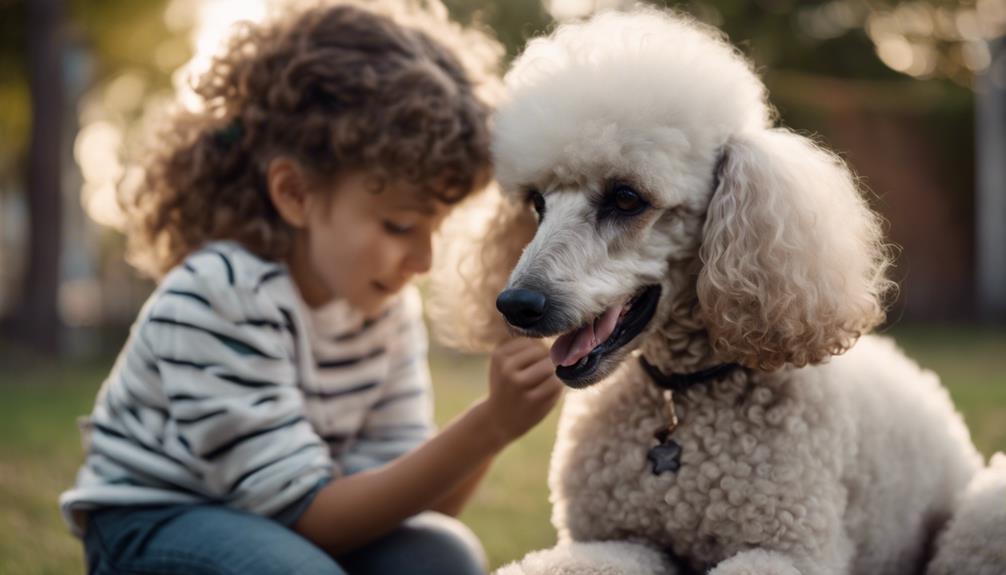
When training poodles for child interaction, it's crucial to focus on their behavior around kids and establish boundaries early on. Positive reinforcement techniques can help poodles understand how to interact gently and patiently with children. Basic obedience training lays the foundation for a safe and harmonious relationship between poodles and kids.
Poodle Behavior Around Children
To ensure a safe and harmonious interaction between poodles and children, training these intelligent dogs to be patient and gentle is crucial. Here are some key points to consider when training poodles for child interaction:
- Positive Reinforcement: Use rewards and praise to encourage good behavior around children.
- Proper Training: Teach poodles how to behave and interact safely with kids.
- Socialization: Expose poodles to different environments and people, including children, to help them feel comfortable and calm.
- Setting Boundaries: Establish rules and boundaries to prevent any potential issues during interactions with kids.
Establishing Boundaries Early
Establishing boundaries early through consistent training is essential for fostering a safe and positive relationship between poodles and children. Training poodles from a young age to understand commands like 'sit,' 'stay,' and 'leave it' is crucial in managing their behavior around kids. By consistently reinforcing these rules and boundaries, you can ensure a harmonious dynamic between your poodle and your children. Setting clear expectations early on helps poodles grasp their role within the family unit, promoting a sense of structure and security. Utilizing positive reinforcement techniques during training sessions encourages poodles to associate following boundaries with positive experiences, further solidifying their understanding of appropriate behavior around children. Remember, early training is key to creating a safe and happy environment for both poodles and children.
Safe Playtime for Poodles and Kids
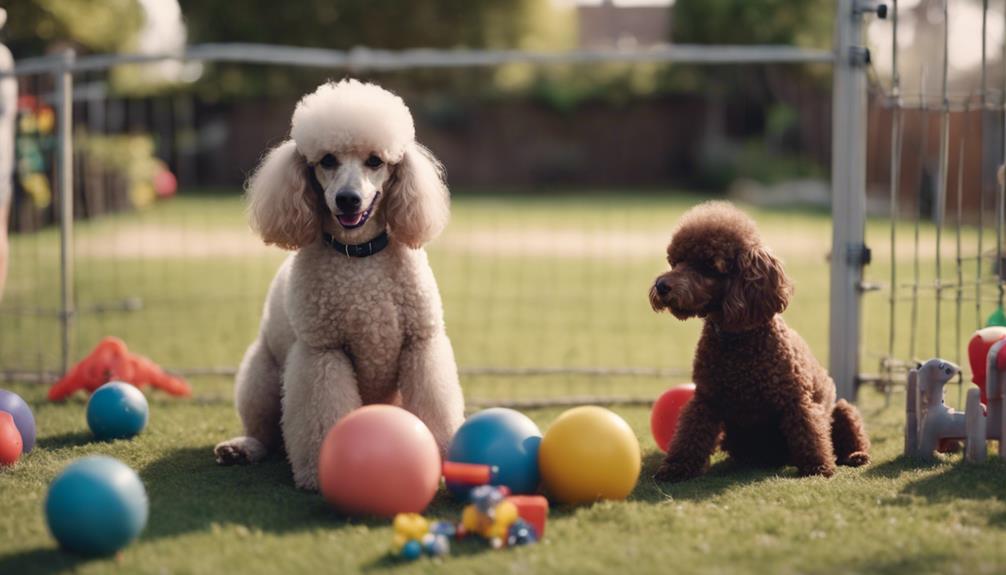
During playtime between poodles and kids, it is crucial to supervise their interactions to ensure safety and prevent any rough behavior. Here are some tips to make playtime between poodles and kids safe and enjoyable:
- Teach Gentle Play: Instruct children to play gently with poodles, avoiding actions like pulling on ears or tail that may agitate the poodle.
- Use Interactive Toys: Utilize interactive toys and games to facilitate positive play experiences, encouraging appropriate play behavior and keeping both the poodle and child engaged.
- Encourage Structured Activities: Promote structured play activities that enhance bonding between the poodle and child while prioritizing safety. This can include games that involve gentle interaction and cooperation.
- Establish Boundaries: Set clear boundaries for playtime to create a safe space for both the poodle and child. Boundaries help define acceptable behavior and ensure a harmonious play environment.
Health Guidelines for Poodles and Kids
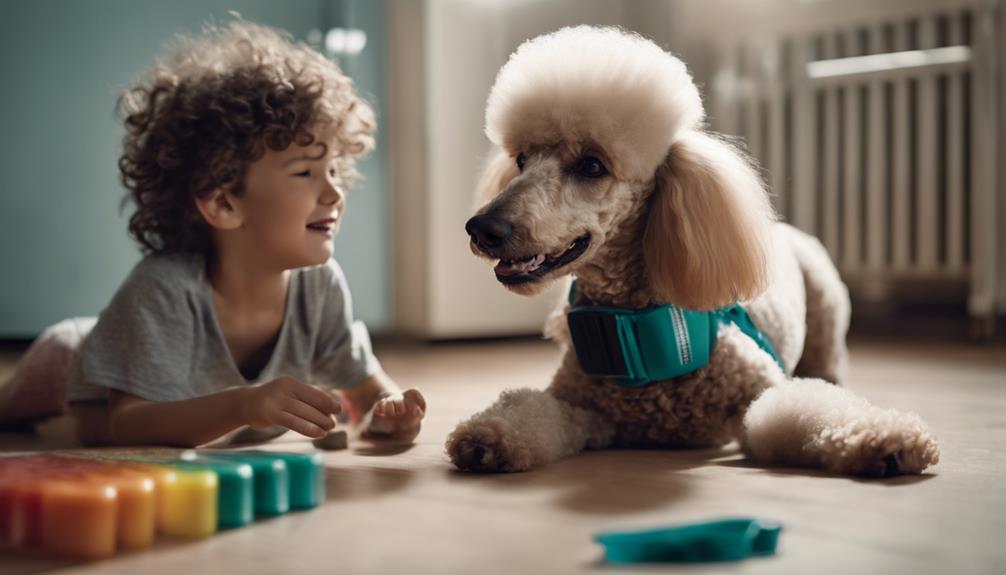
Regular vet check-ups play a crucial role in ensuring the health and well-being of both poodles and children, helping to address any potential health concerns promptly. By scheduling regular veterinary check-ups for your poodle, you can stay informed about any underlying health issues that may impact their interactions with children. Understanding common health issues like allergies or hip dysplasia can guide parents in creating a safe environment for both pets and kids. Additionally, practicing proper grooming techniques, including dental care and hygiene, is vital for maintaining a healthy and safe relationship between poodles and children. Being aware of potential food allergies in poodles can assist parents in selecting safe treats and foods for both their furry friend and the child. Moreover, keeping a clean living environment can significantly reduce health risks for both poodles and children, fostering a secure and harmonious bond. Remember, regular vet check-ups are not only beneficial for your poodle's health but also for the well-being of your entire family.
Establishing Safe Boundaries for Poodles
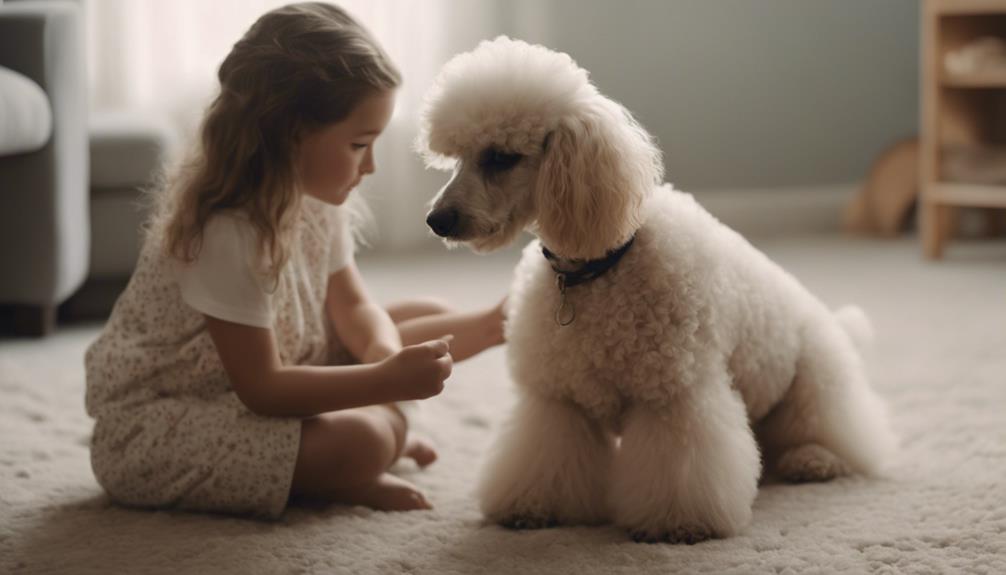
To ensure a secure and harmonious relationship between your poodle and children, it is important to designate a specific safe area in your home for the poodle to retreat to when needed. This safe space provides a sanctuary for your poodle where they can feel relaxed and secure. Here are some essential tips for establishing safe boundaries for your poodle:
- Designate a Safe Area: Create a designated space in your home where your poodle can retreat to when they need some time alone.
- Teach Respect: Instruct children to respect the poodle's safe space and not disturb them when they are in that area.
- Provide Comfort: Offer a crate, room, or cozy corner for the poodle to establish boundaries and ensure their comfort.
- Prioritize Well-being: Respecting your poodle's boundaries is crucial for their overall well-being and sense of security.
Building Trust Between Poodles and Kids
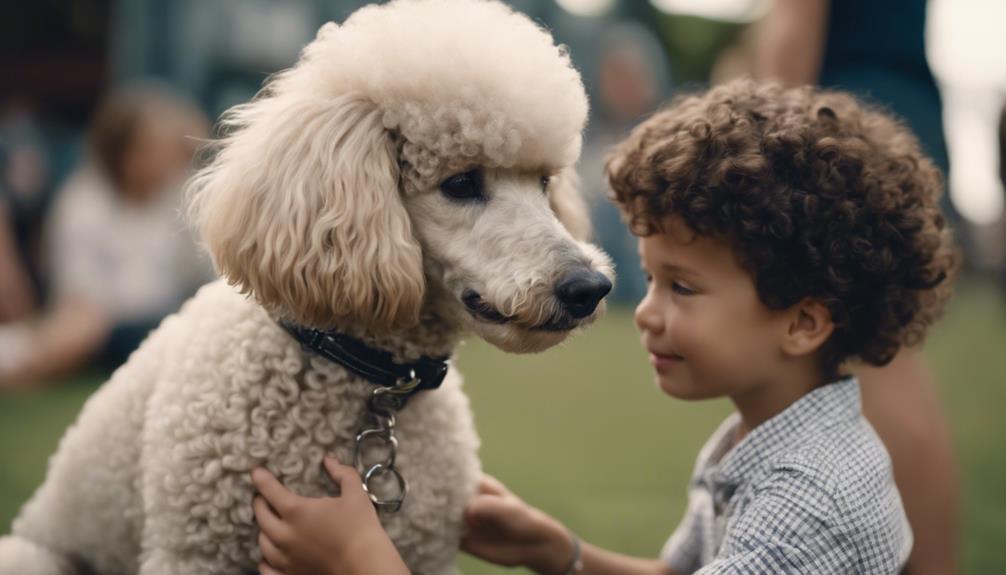
Building trust between poodles and kids is essential for a harmonious relationship. By engaging in gentle interactions, setting boundaries with respect, and encouraging positive playtime, you can help foster trust between your poodle and your children. Remember, creating a safe and nurturing environment is key to building a strong bond between these two important members of your family.
Trust Through Gentle Interactions
Engaging in gentle interactions with your poodle, such as soft petting and using calm voices, is crucial for fostering trust between your poodle and your child. To build trust through gentle interactions, remember to:
- Introduce gradually: Allow the poodle to approach at its own pace to feel safe and comfortable.
- Teach respect: Instruct children to respect the poodle's boundaries, like not disturbing while eating or sleeping, to establish trust.
- Supervise consistently: Ensure a safe environment by supervising interactions, promoting a positive atmosphere for trust to grow.
- Create positive experiences: Encourage interactive play and gentle handling to strengthen the bond and trust between your poodle and child.
Setting Boundaries With Respect
Respect your poodle's personal space and boundaries to establish trust and a secure environment for interactions with children. By setting clear rules for interaction, you help your poodle feel safe and comfortable around kids. Consistently reinforcing these boundaries is key to building trust and fostering a positive relationship. Pay attention to your poodle's signals and body language as they communicate their comfort levels. This mutual understanding of boundaries is crucial for creating a harmonious bond between your poodle and your children.
| Tips for Setting Boundaries | Benefits |
|---|---|
| Teach children to respect personal space | Builds trust |
| Set clear rules for interaction | Creates a secure environment |
| Consistent reinforcement of boundaries | Fosters positive relationship |
Encouraging Positive Playtime
To cultivate a strong bond between your poodle and children, fostering positive playtime interactions is essential. Here are some tips to encourage a safe and enjoyable playtime experience for both your poodle and kids:
- Supervised Play Sessions: Ensure that all play sessions are supervised to create a secure environment for interaction.
- Engage in Fun Activities Together: Encourage activities that are enjoyable for both poodles and children to help them understand each other better.
- Encourage Gentle Play: Promote gentle play and reward good behavior to reinforce a positive relationship.
- Effective Communication: Through interactive play, poodles and kids can learn to communicate effectively and form a lasting bond based on trust and understanding.
Poodle Behavior Cues Around Children
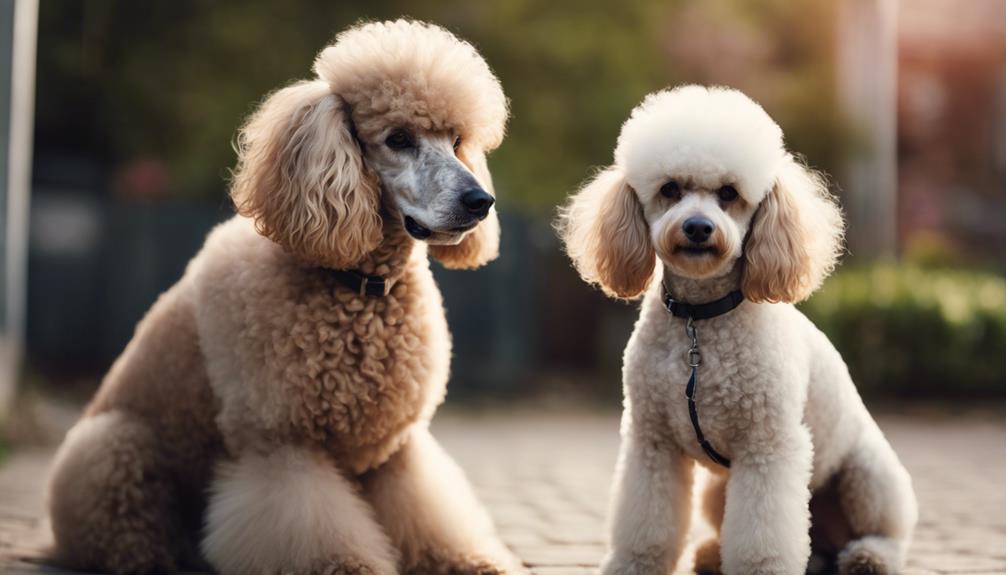
Watching for subtle cues in a poodle's behavior can help you understand their comfort level around children. When a poodle displays good behavior around kids, you might notice them wagging their tails, licking, or nuzzling as signs of affection and bonding. Look for indicators like a relaxed body posture, perked-up ears, and a wagging tail, which suggest that the poodle is comfortable and enjoying the interaction. On the other hand, be alert to signs such as growling, barking, or cowering, which could indicate that the poodle is feeling stressed or threatened. Poodles seeking attention may nudge or sit close to children, showing their interest in interacting. Additionally, calm and gentle behaviors like leaning against children or offering a paw are signals of the poodle's friendly intentions. By observing these cues, you can better understand how the poodle is feeling and ensure a positive and safe relationship with children.
Encouraging Positive Interactions
When encouraging positive interactions between your child and the poodle, focus on creating a loving and respectful environment. Teach them the importance of mutual respect and setting boundaries early on in their interactions. By fostering a safe and understanding dynamic during playtime, both the child and the poodle can build a strong and lasting bond.
Poodle-Child Playtime Dynamics
Engage your poodle and child in interactive playtime to foster positive interactions and nurture their bond. Here are some tips to enhance the poodle-child playtime dynamics:
- Structured Play: Plan activities like fetch or hide and seek to keep both the poodle and child engaged while promoting bonding.
- Gentle Interactions: Teach your child how to play gently with the poodle, respecting boundaries and promoting effective communication.
- Basic Obedience Training: Incorporate simple training exercises during playtime to encourage cooperation and strengthen the poodle-child relationship.
- Supervised Sessions: Always supervise playtime to ensure safety, enjoyment, and the development of trust and mutual understanding between your poodle and child.
Teaching Mutual Respect
To create a positive relationship between your child and poodle, start by teaching mutual respect through gentle interactions and clear boundaries. When teaching children, emphasize approaching poodles calmly and seeking permission before petting. Show them how to stroke the poodle's fur gently and avoid disturbing them during rest or meal times. Encourage speaking softly around the poodle and respecting their personal space for positive interactions. It's crucial to instill empathy and respect for animals in children, fostering a safe and harmonious relationship with poodles. Always supervise these interactions to ensure both children and poodles feel comfortable and secure during their bonding process.
| Teaching Children | Mutual Respect | Positive Interactions |
|---|---|---|
| Approach calmly | Ask for permission to pet | Stroke gently, avoid disruptions |
| Speak softly | Respect personal space | Encourage empathy |
| Show gentle touch | Avoid disturbing poodle | Supervise interactions |
Setting Boundaries Early
Establishing clear boundaries early on lays the foundation for fostering positive interactions between poodles and children. To encourage positive interactions, consider the following:
- Teach Respect: Educate children on respecting the poodle's space and signals to build trust and understanding.
- Promote Gentle Interactions: Encourage gentle actions like petting and play to strengthen the bond between poodles and children.
- Address Discomfort: Be attentive to any signs of stress or discomfort from either the poodle or the child to maintain a secure environment.
- Provide Supervision: Consistent supervision and guidance in setting boundaries create a secure and loving relationship between poodles and children for years to come.
Supervising Poodle-Child Interactions
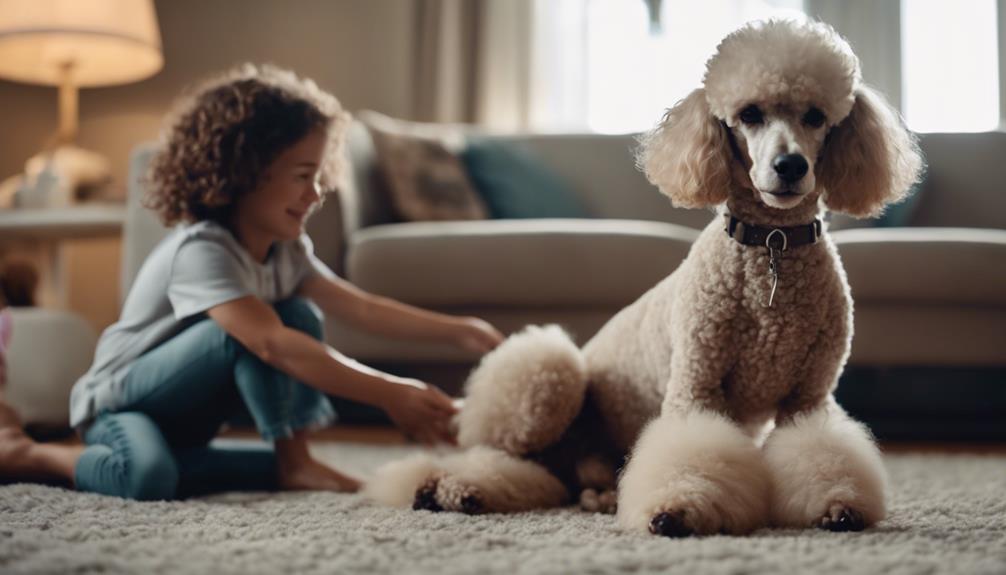
When supervising interactions between your poodle and children, always prioritize safety and attentive observation to prevent any potential issues. It is crucial to be present and alert during these interactions to ensure a positive and safe relationship. Address any signs of discomfort or aggression from the poodle immediately. Watch for body language cues such as stiffening, growling, or avoidance. If any concerning behavior is observed, separate the poodle from the children and seek professional advice if necessary. It's important to prevent rough play or teasing that could lead to misunderstandings or negative reactions from the poodle. By properly supervising and managing these interactions, you can establish a foundation of trust and understanding between your poodle and the children. Remember, proactive supervision can help create a harmonious bond between your poodle and the little ones in your life.
Ensuring Poodle Exercise With Kids
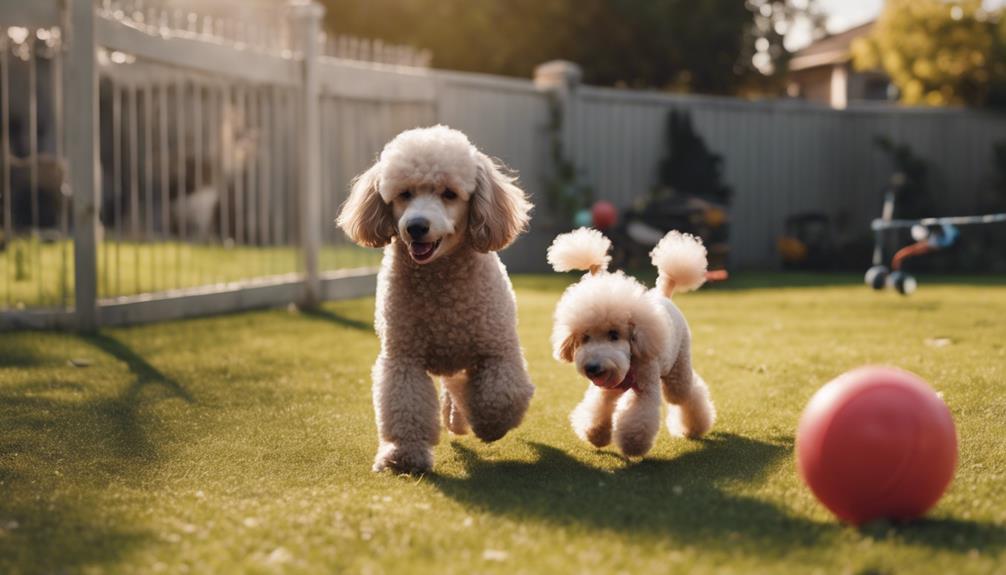
Ensuring your poodle gets enough exercise alongside children is essential for both their physical health and bond development. Here are some ways to ensure your poodle gets the exercise they need while spending quality time with your kids:
- Playing Fetch: Encourage your children to engage in games like playing fetch with the poodle. This activity not only provides physical exercise but also strengthens the bond between the poodle and the kids.
- Interactive Activities: Incorporate interactive games and training sessions that involve both the poodle and the children. This not only keeps the poodle mentally stimulated but also fosters a sense of teamwork and companionship.
- Structured Playtime: Implement a routine for structured playtime where the poodle and the kids can engage in activities together. This helps prevent boredom, promotes exercise, and enhances the relationship between them.
- Regular Exercise: Make sure to schedule regular exercise sessions with the kids and the poodle. Consistent physical activity not only benefits the poodle's health but also ensures a strong and healthy bond between the poodle and the children.
Poodle Adaptation to Family Dynamics
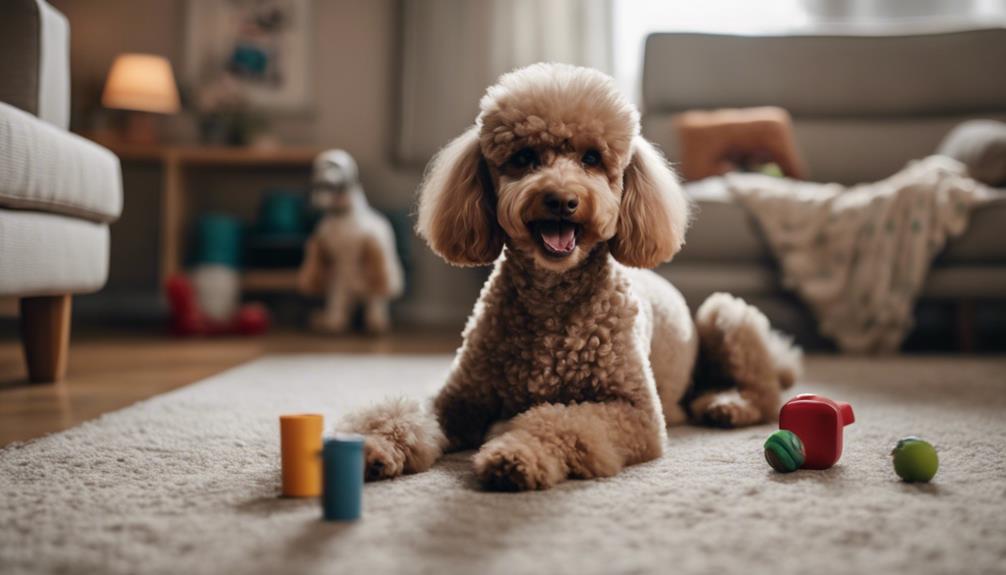
Adapting seamlessly to the dynamics of your family, poodles showcase their loyal and affectionate nature, forming strong bonds with children through their patient and gentle demeanor. These loyal dogs possess a remarkable ability to adjust to various family scenarios, making them exceptional companions for households with children. Their intelligence enables them to comprehend and integrate into the family dynamics effectively, ensuring a harmonious relationship. By providing proper training and socialization, you can further enhance the bond between your poodle and your child, fostering a safe and enduring connection.
Poodles' adaptability extends beyond physical environments; they adeptly acclimate to the emotional atmosphere of your home, offering comfort and companionship to your children. Their loyal nature shines through as they become integral parts of your family unit, standing by your side through playtimes, learning moments, and quiet times of solace. By welcoming a poodle into your family, you invite a loyal, affectionate friend who will enrich your child's life with love and companionship.
Nurturing Respectful Poodle-Child Relationships
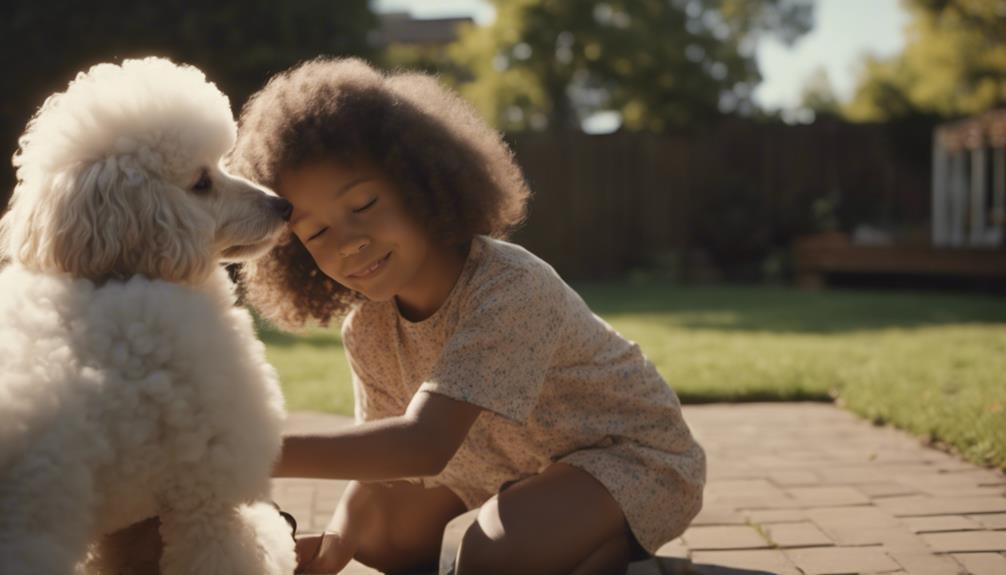
To cultivate a harmonious bond between your poodle and child, it is essential to teach your child respectful interactions with the dog. Here are some tips to help you create a safe and loving relationship between your child and your poodle:
- Ask Permission: Teach children to always ask for permission before petting the poodle. This promotes respect for the dog's boundaries and helps prevent unwanted interactions.
- Gentle Stroking: Show kids how to gently stroke the poodle's fur. This helps establish positive interactions and ensures the dog feels comfortable and safe.
- Speak Softly: Encourage children to speak softly and calmly around the poodle. Creating a peaceful atmosphere will help the dog feel secure and respected.
- Respect Boundaries: Teach kids not to disturb the poodle while eating or sleeping. Respecting the dog's space and routines will contribute to a safe and trusting relationship.
Long-Term Safety Measures
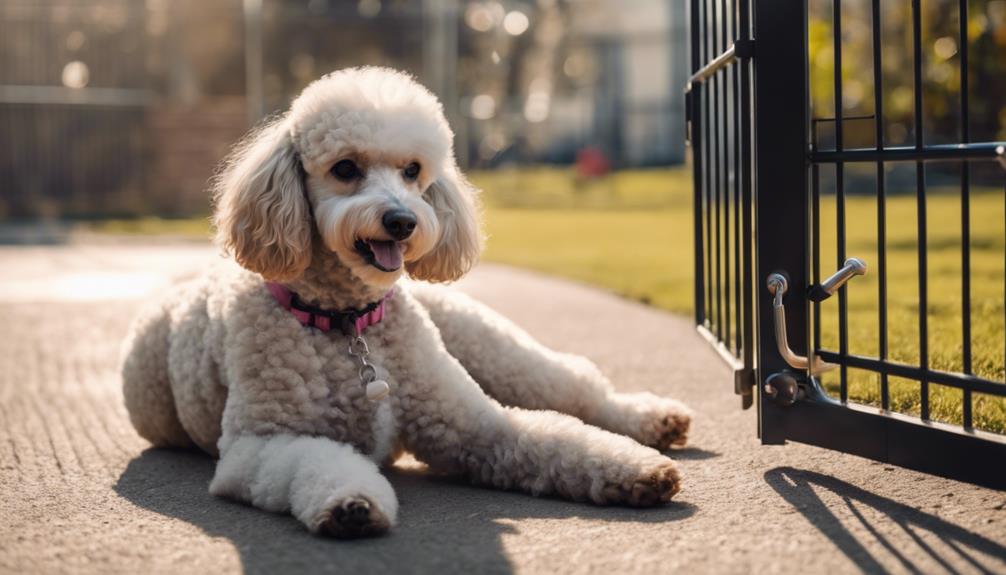
To foster a secure environment for both your poodle and children in the long run, consider implementing essential long-term safety measures. Start by designating a child-free zone where your poodle can retreat for relaxation and space when needed. Teaching your children to recognize signs of stress or discomfort in the poodle is crucial in preventing potential issues. Consistent rules and boundaries should be set to establish a safe and predictable environment for both the poodle and children. Regularly monitoring interactions is key to ensuring positive engagement and intervening promptly in case of any conflicts or misunderstandings that may arise. Engaging in positive reinforcement training will help foster a harmonious relationship between your poodle and children, promoting mutual respect and understanding. By incorporating these long-term safety measures, you can strengthen the bond between your poodle and children while prioritizing their well-being and safety.
Frequently Asked Questions
Are Poodles Friendly With Kids?
Yes, Playful Poodles are incredibly friendly with kids. Their gentle nature and patient demeanor make them ideal companions for children of all ages. With proper training and supervision, Poodles can form a safe and loving bond with kids.
Are Poodles Protective of Their Family?
Poodle loyalty shines through their protective nature, always watching over their family. They assess threats and act to keep loved ones safe. With proper training, their natural instincts harmonize with children, building a strong, safe bond.
Why Do Poodles Follow You Everywhere?
Poodle behavior involves following you everywhere as a sign of their loyalty and desire for closeness. Their intelligence and social nature drive them to stick by your side, creating a strong bond based on trust and companionship.
Do Dogs Bond With Children?
Dogs bond with children through dog therapy, benefiting their social, emotional, and cognitive development. Their intuitive nature provides comfort and support, fostering empathy and confidence. Growing up with dogs can lead to higher self-esteem and improved social skills.
Conclusion
In conclusion, as you continue to nurture the bond between your poodle and children, remember that love is the leash that binds them together. With patience, training, and supervision, you can create a harmonious relationship where furry paws and little hands play together safely. Keep in mind that like a gentle breeze guiding a kite, your guidance and care will help your poodle soar alongside your children, creating lasting memories of joy and companionship.
